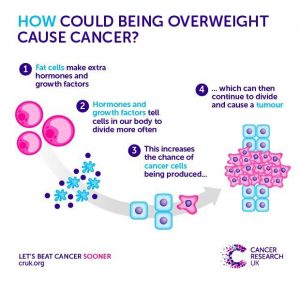Being obese is a serious health risk especially because obesity is a risk factor which causes cancer. This is because the excess fat cells secrete extra hormones and growth factors that stimulate cells to multiply. Which then, there is an increased chance of cancer cell also reproducing in vast numbers.

How does being overweight cause cancer?
https://www.cancerresearchuk.org/about-cancer/causes-of-cancer/obesity-weight-and-cancer/does-obesity-cause-cancer
The fact that obesity is a major risk factor for malignancies has been proven many times, but the relationship between obesity and the immune response is not very well understood. Ironically, a recently published scientific study has shown that obese patients had a greater survival outcome to targeted therapy to treat Metastatic Melanoma. This suggests that obesity has some kind of factor that helps these patients respond better to treatments.
Metastatic Melanoma is an advanced skin cancer where the cancer cells spread to other parts of the body, such as the lungs, liver and brain. Patients at this stage of cancer are treated with targeted therapy, checkpoint inhibitor immunotherapies and chemotherapy. Dr. McQuade and her colleagues followed 2046 patients with metastatic melanoma that were actively receiving one or more of these treatments from Aug. 8, 2006, to Jan. 15, 2016. Each patient was classified as normal, overweight or obese according to the body-mass index (BMI). The results show that compared to patients with normal BMI, obese patients had improved overall survival. Obese patients lived about 27 months with advanced melanoma cancer while normal BMI patients lived to only about to 17 months, near doubling in survival.

PD-1 protein inhibiting T-cells & Immune Response
https://www.arigobio.com/news/new-spd-1-elisa-kit
It is suspected that the treatment works very well for obese patients because of the amplified results from the treatment. Advanced Melanoma treatment works by blocking activation of a protein, PD-1. Tumours stimulate the release of these proteins because they reduce the amount of immune response towards cancerous cells. In obese patients, there are greater amounts of PD-1 than in normal BMI patients and also a greater amount of leptin, a hormone created by fat cells which trigger a pathway that increases PD-1. So as soon as the treatment is in effect, the PD-1 is removed and the immune response is increased. With abundant nutrient available in obese patients, the immune response works better to attach the cancer cells.
Unfortunately, this study also showed these results were only applicable to men and there was no association between obesity and survival rates in women. Also, treating metastatic melanoma patients with a high-fat diet to mimic the effects of obesity can cause harm to patients so further research is needed before clinically used.
